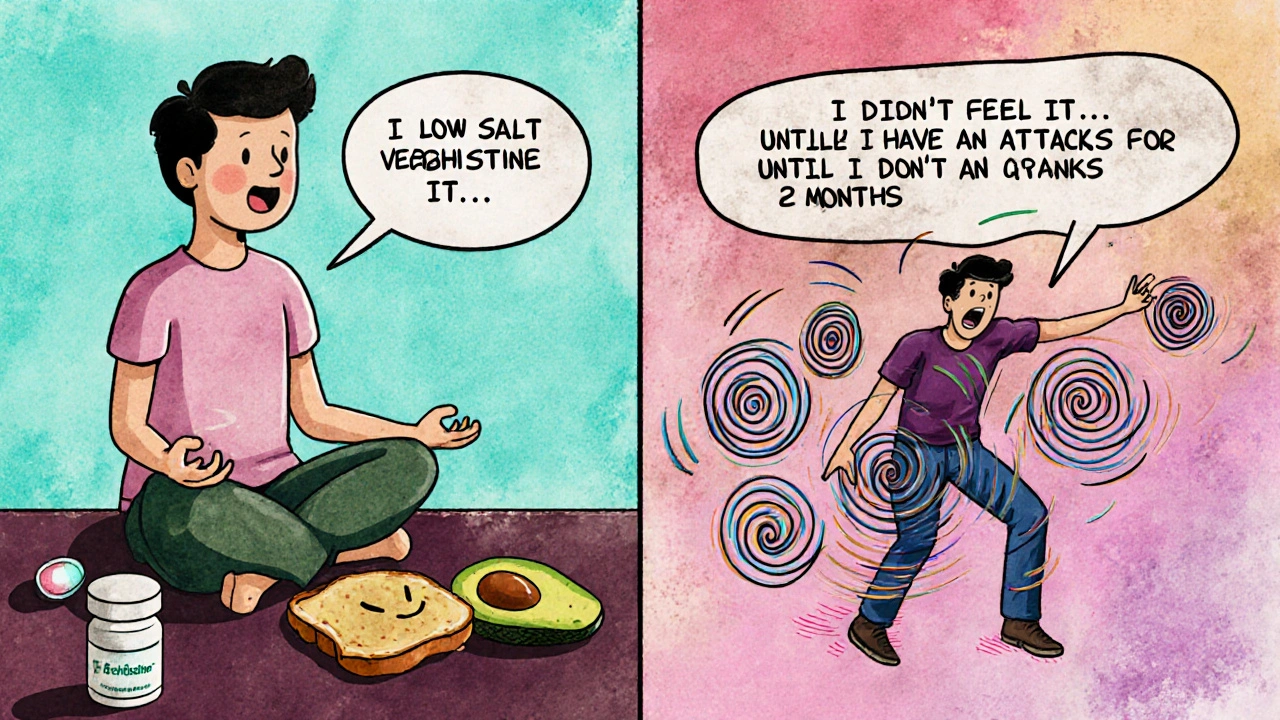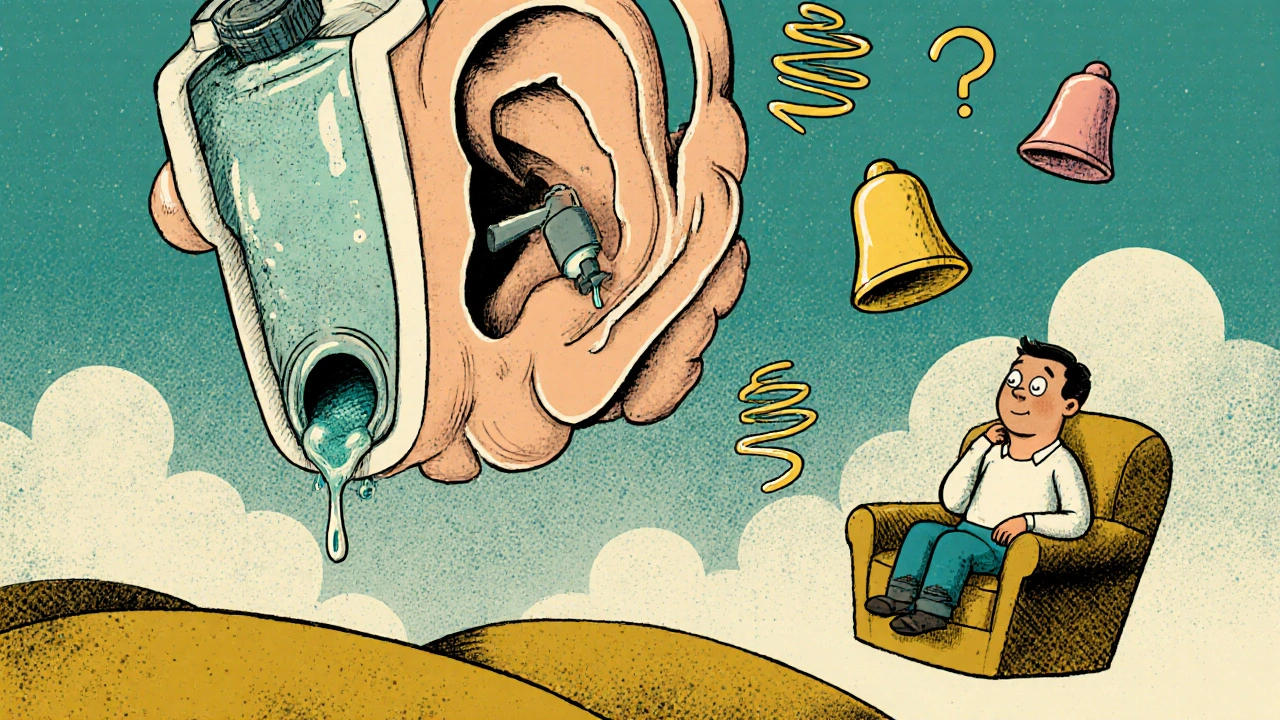If you’ve been prescribed betahistine for dizziness, vertigo, or ringing in the ears, you’ve probably looked at the price and wondered: is this really worth it? It’s not cheap-especially if you’re paying out of pocket. But for many people, the relief it brings makes the cost feel justified. For others, it’s a waste of money. The truth? It depends on your condition, your body, and what else is available.
What is betahistine, really?
Betahistine is a medication used mainly to treat Ménière’s disease-a disorder of the inner ear that causes spinning dizziness (vertigo), hearing loss, tinnitus, and a feeling of fullness in the ear. It’s not a cure. It doesn’t fix the damaged hair cells or fluid buildup. Instead, it works by improving blood flow in the inner ear and reducing the pressure of excess fluid. Think of it like turning on a small pump to drain a leaky bathtub.
The most common brand names are Serc and Betaserc, but generic versions are widely available. It comes in 8 mg, 16 mg, and 24 mg tablets. Most people take it two or three times a day with meals. It’s not a quick fix. You won’t feel better the next day. It often takes 2 to 6 weeks to notice any change. That’s why many people give up too soon.
How much does betahistine cost?
In New Zealand, a 30-day supply of generic betahistine 16 mg tablets costs between $25 and $45 without subsidy. Brand-name Serc can run up to $70. If you’re on a prescription subsidy card (which most residents are), you pay the standard $5 per prescription-regardless of the drug’s actual cost. That makes it affordable for most people.
But if you’re not eligible for subsidy-say, you’re a visitor, a student without access to public health benefits, or you’re buying online from overseas-the price jumps. A 90-day supply from a reputable international pharmacy might cost $60 to $100 USD. That’s a big difference when you’re paying full price.
Compare that to other vertigo treatments: vestibular rehab therapy costs $80 to $150 per session, and you might need 6 to 12 sessions. Vestibular suppressants like meclizine are cheaper per pill but only mask symptoms and can cause drowsiness. Betahistine doesn’t make you sleepy. That’s a big plus for people who drive, work, or care for kids.
Does it actually work?
Here’s where things get messy. Clinical trials show mixed results. A 2021 Cochrane review analyzed 18 studies involving over 1,500 people with Ménière’s disease. The conclusion? Betahistine likely reduces the frequency and severity of vertigo attacks-but the effect is modest. About 50% of users reported fewer episodes. The other half saw little to no change.
Real-world experience is different. In clinics in Dunedin and Wellington, doctors report that patients who stick with it for at least three months often say, “I didn’t think it worked… until I realized I hadn’t had an attack in two months.” That’s the quiet win. It’s not about feeling amazing every day. It’s about avoiding the panic of sudden spinning, the nausea, the fear of falling.
For tinnitus, the evidence is weaker. Some people swear betahistine helps with the ringing. Others notice nothing. There’s no solid proof it reduces tinnitus volume, but it may make the brain less sensitive to the noise over time-kind of like noise-canceling headphones for your nerves.

Who benefits the most?
Betahistine isn’t for everyone. It works best for people with:
- Recurrent vertigo attacks linked to Ménière’s disease
- Normal hearing (or mild fluctuating loss)
- No history of peptic ulcers or pheochromocytoma (rare tumors)
- Willingness to take it consistently for at least 2-3 months
It’s less likely to help if your dizziness comes from neck problems, low blood pressure, anxiety, or migraines. If your doctor hasn’t ruled those out, betahistine might just be a distraction.
Also, don’t expect miracles if you’re still drinking caffeine, eating salty foods, or skipping sleep. Betahistine can’t fix bad habits. It works best when paired with lifestyle changes: low-salt diet, hydration, stress reduction, and vestibular exercises.
Side effects: what to watch for
Betahistine is generally safe. But about 1 in 10 people get mild stomach upset-bloating, nausea, heartburn. Taking it with food cuts that down. Rarely, it can cause headaches or skin rashes. If you’re allergic to histamine (very uncommon), you might react.
It’s not a drug you take for years without review. After 6 months, your doctor should check: Are attacks still happening? Are you on the lowest effective dose? Could you stop it now? Some people taper off successfully. Others need to stay on it long-term.
Alternatives: what else can you try?
If betahistine doesn’t work-or costs too much-here are other options:
- Vestibular rehabilitation therapy (VRT): A series of exercises guided by a physiotherapist. Proven to retrain the brain to compensate for inner ear imbalance. Costs more upfront but lasts longer.
- Diuretics (like hydrochlorothiazide): Help reduce inner ear fluid. Often used with betahistine. Can cause low potassium.
- Low-sodium diet: Simple, free, and effective. Cutting salt to under 1,500 mg/day reduces vertigo attacks in 60% of Ménière’s patients.
- Stress management: Anxiety triggers attacks. Meditation, yoga, and breathing exercises can cut frequency by half in some cases.
- Injections (gentamicin or steroids): For severe cases. Gentamicin can cause hearing loss. Steroids are safer but temporary.
Many people use a mix: betahistine for daily control, VRT for long-term recovery, and diet to reduce triggers. It’s not one magic pill-it’s a toolkit.

Is betahistine worth the cost?
Here’s how to decide:
- If you pay $5 with a subsidy → Yes, try it. It’s low-risk, and the chance of improvement is real.
- If you pay $50-$100 out of pocket → Wait. Try lifestyle changes first. Do VRT. See if symptoms improve without drugs.
- If you’ve tried it for 3 months and feel nothing → Stop. Don’t waste money or time.
- If you’ve had one bad attack and are scared → Don’t self-prescribe. Get a proper diagnosis. Betahistine won’t help if it’s not Ménière’s.
The real value isn’t in the pill. It’s in the peace of mind. Knowing you have something that might stop the next attack-that’s priceless for people who live in fear of sudden dizziness.
Frequently Asked Questions
How long does it take for betahistine to start working?
Most people notice a reduction in vertigo attacks after 2 to 6 weeks of daily use. It doesn’t work like a painkiller-you won’t feel better right away. Consistency matters. Skip doses, and you won’t get the full benefit.
Can you take betahistine long-term?
Yes, many people take it for months or even years if it’s helping. But doctors usually recommend a review every 6 months. Some patients eventually reduce their dose or stop completely after their symptoms stabilize.
Does betahistine help with tinnitus?
It might, but not reliably. Studies show mixed results. Some people report the ringing becomes less annoying or less constant. Others notice no change. It’s not a primary treatment for tinnitus, but it can be part of a broader strategy.
Is betahistine safe with other medications?
Generally yes, but avoid combining it with other histamine-based drugs or antihistamines like diphenhydramine, as they can cancel each other out. Always tell your doctor what else you’re taking, especially if you’re on blood pressure meds or antidepressants.
What happens if I stop taking betahistine?
If it was working, your vertigo attacks may return. But stopping doesn’t make your condition worse. You can stop at any time. Some people taper off slowly; others quit cold turkey. There’s no withdrawal effect.
Final thoughts
Betahistine isn’t a miracle drug. But for people with Ménière’s disease, it’s one of the few tools that addresses the root cause-not just the symptoms. If you’re paying $5 a prescription, it’s a no-brainer to try it. If you’re paying full price, weigh it against other options: diet, therapy, lifestyle. Don’t rush to blame the medicine if it doesn’t work. Give it time. Track your attacks. Talk to your doctor. And remember: the goal isn’t perfection. It’s fewer surprises, more control, and the quiet confidence that you’re not powerless against your own body.

Betahistine’s mechanism of action is fascinating from a neurophysiological standpoint-it’s a histamine H3 receptor antagonist and H1 receptor agonist, which together modulate vestibular blood flow and endolymphatic pressure. The Cochrane review’s modest effect size is consistent with the pharmacokinetic reality: it doesn’t cross the blood-labyrinth barrier efficiently, so therapeutic concentrations are marginal. That said, the placebo-controlled trials with longitudinal tracking do show a statistically significant reduction in attack frequency when compliance exceeds 80% over 12 weeks. The real value isn’t in the pill-it’s in the structured monitoring of symptom diaries alongside dosage titration. Many clinicians overlook this.
bro just take meclizine 😭 it’s $5 at walmart and you don’t feel like a zombie. betahistine is just fancy water with a 3 month wait. why are we paying $70 for a glorified placebo? 🤡
I tried betahistine for 4 months. Didn’t work. Then I stopped. And guess what? My vertigo didn’t come back for 6 months. Coincidence? Or did my brain finally learn to stop panicking? 🤔 Maybe the real treatment was *not* taking the pill. 🙃
From my clinical experience in Lagos, where access to subsidized medications is rare, patients who adopt low-sodium diets and daily vestibular exercises show comparable improvement to those on betahistine. The medication is not inherently superior-it is merely more accessible in high-income countries. I encourage patients to begin with non-pharmacological interventions. The cost barrier is not just financial; it is psychological. Many believe a pill must be the answer, when the body often heals best with rhythm, not chemistry.
I swear this drug is just Big Pharma’s way of making people feel like they’re doing something while they keep their insurance premiums high. I got prescribed this after one dizzy spell and now I’m on it for ‘prevention’? Like, what if I’m just dehydrated? Or stressed? Or have a damn pinched nerve? Nobody checks. They just hand you a script and a smile. 😒
Have you considered that betahistine is a repurposed antihistamine originally developed for allergy research? The FDA never approved it for vertigo-it was grandfathered in through EU regulatory loopholes. The ‘clinical trials’ are funded by manufacturers with undisclosed conflicts. And yet, every doctor treats it like gospel. Meanwhile, vestibular rehab is underfunded, under-researched, and pushed aside because it doesn’t come in a bottle with a patent. This isn’t medicine-it’s institutional inertia.
There’s a deeper metaphysical question here: if a drug reduces the frequency of an attack but doesn’t eliminate the underlying dysfunction, is it healing-or merely delaying the confrontation with vulnerability? We treat vertigo as a medical event, when perhaps it’s a somatic signal-a call to reevaluate our relationship with balance, both physiological and existential. Betahistine offers control, but control is an illusion. True peace comes not from suppressing symptoms, but from listening to the body’s quiet, persistent language.
The assertion that betahistine is ‘worth it’ at $5 under subsidy is statistically misleading. The marginal benefit is approximately 12% reduction in attack frequency, with a number needed to treat (NNT) of 4.5. Meanwhile, vestibular rehabilitation has an NNT of 3.1 and carries zero pharmacological risk. The subsidy system incentivizes pharmaceutical dependency over evidence-based physical therapy. This is not healthcare-it’s cost-shifting disguised as accessibility.
It’s ironic-we spend billions chasing chemical fixes for conditions that stem from modern life: chronic stress, sleep deprivation, processed diets. Betahistine is a bandage on a broken foundation. The real question isn’t whether it works-it’s why we’ve built a system where the only ‘solution’ we’re offered is a pill. If inner ear pressure is caused by fluid imbalance, why not ask why the body is retaining fluid in the first place? Salt, stress, silence. Not a prescription. A lifestyle. We’ve outsourced healing to pharmacies because we’re too tired to change.
Let me be candid: betahistine is a placebo with a pharmacokinetic pedigree. The Cochrane review admits as much. But here’s the truth no one wants to say-people don’t take it for efficacy. They take it for the ritual. The act of swallowing a pill gives the illusion of agency. In a world of chaos, control is a drug too. And if that drug costs $5, who am I to judge? But don’t mistake ritual for remedy. If you’re still drinking Red Bull and scrolling at 2 a.m., no pill will save you. The body doesn’t lie. It just gets louder when you stop listening.